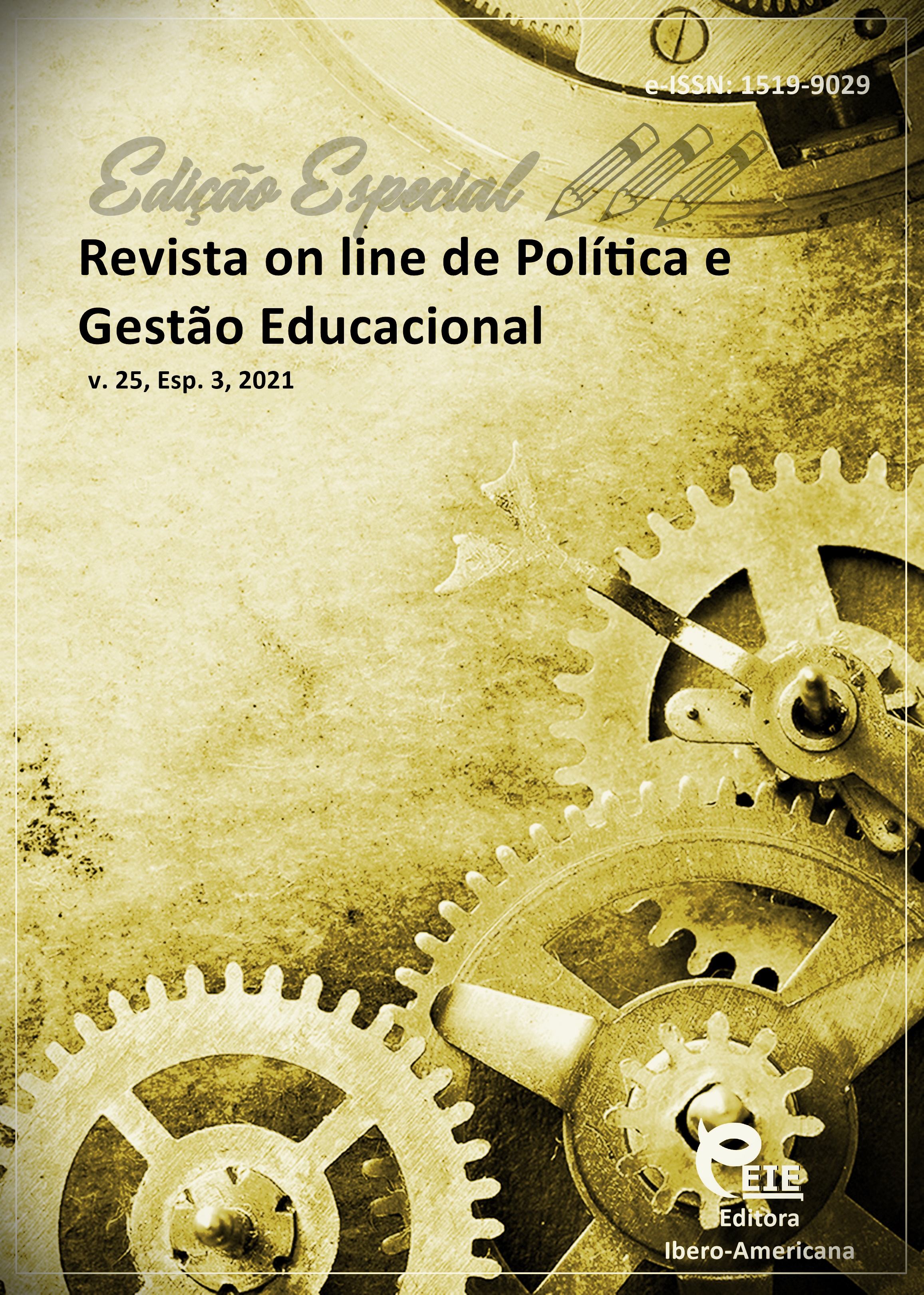Arquitetura de dados sobre plataformas educacionais digitais e competência dos professores
DOI:
https://doi.org/10.22633/rpge.v25iesp.3.15591Palavras-chave:
Arquitetura de dados, Análise de dados educacionais, Competência de dados de um professor, Educação para o desenvolvimento, Ampliação do desenvolvimentoResumo
O trabalho tem como objetivo identificar a arquitetura de dados e estruturar os tipos de dados educacionais analisados nas diversas plataformas educacionais digitais. O artigo apresenta materiais de pesquisa pelo método de análise genética das ações laborais e tarefas profissionais de um professor, necessários para uma organização competente de desenvolvimento com base em dados. O Estudo 1 estudou 25 plataformas educacionais digitais para educação geral de diferentes países, incluindo 9 russas (públicas, privadas e corporativas). O Estudo 2 incluiu o método de análise genética das ações laborais e tarefas profissionais dos professores para organizar o desenvolvimento das crianças com base na análise de dados educacionais. Os resultados obtidos permitem dizer que no ambiente educacional digital se amplia o leque de atribuições profissionais e se transformam as ações laborais do professor na implementação de atividades de desenvolvimento (como função laboral) a partir da análise de dados educacionais.
Downloads
Referências
ANDERSON, C. Analytical culture: From data collection to results. Litagent MIF, Moscow, 2017.
BETELIN, V.V.; KUSHNIRENKO, A.G.; SEMENOV, A.L.; SOPRUNOV, S.F. On digital literacy and the environments of its formation. Informatics and its applications, v. 14, n. 4, p. 100-107, 2020.
CARRETERO GOMEZ, S.; VUORIKARI, R.; PUNIE, Y. DigComp 2.1: The Digital Competence Framework for Citizens with eight proficiency levels and examples of use. Publications Office of the European Union, Luxembourg, 2017. Available: https://publications.jrc.ec.europa.eu/repository/handle/JRC106281
DAVYDOV, V.V. Theory of developmental learning. INTOR, Moscow, 1996.
Decree of the President of the Russian Federation No. 642. On the Strategy of Scientific and Technological development of the Russian Federation. December 1, 2016. Available: http://www.kremlin.ru/acts/bank/41449
DHANRAJANI, S. Al and Analytics Accelerating Business Decisions. The new normal in Strategy and Enterprise Transformation. New Delhi: Wiley India Pvt. Ltd., 2018.
EDM 2021 22nd International Conference of Young Specialists in the field of electronic devices and materials. Altai, Russia, June 30 - July 4, 2021. Available: https://edm.ieeesiberia.org
End-to-end technologies of NTI. National Technology Initiative, n.d. Retrieved from: https://nti2035.ru/technology/
FIOFANOVA, O.A. Analysis of the current state of research in the field of data-based education management. Values and meanings, v. 1, n. 65, p. 71-83, 2020a.
FIOFANOVA, O.A. Data-based pedagogy – a strategic direction of pedagogical education: competencies for analyzing educational data in professional and educational standards. The world of university science: culture, education, n. 9, p. 155-167, 2020b.
FIOFANOVA, O.A. Designer of competence modules of professional development programs for data experts in the field of education (Designer of competencies for data experts in education). Certificate of registration of the database (patent) 2020622411, Application No. 2020622293, November 11, 2020c.
ICEDM 2021: 15. International Conference on Educational Data Mining. London, United Kingdom, December 9-10, 2021. Available: https://waset.org/educational-data-mining-conference-in-december-2021-in-london
INMON, W.H.; LINSTEDT, D.; LEVINS, M. Data Architecture: A Primer for the Data Scientist. Academic Press, Moscow, 2019.
International Conference on Educational Data Mining (EDM). Paris, France, 2021. Available: https://educationaldatamining.org/edm2021/
It is necessary to develop a standard for the digital educational environment. Analytical Center under the Government of the Russian Federation, March 3, 2021. Available: https://ac.gov.ru/news/page/neobhodima-razrabotka-standarta-cifrovoj-obrazovatelnoj-sredy-26863
KENNEDY, K.; PETERS, M.; THOMAS, M. How to use the analysis of value-added data to improve the education of schoolchildren: A guide for schools and school district leaders. HSE, Moscow, 2012.
MARGOLIS, A.A. The zone of immediate development (ZBR) and the organization of educational activities of students. Psychological science and education, v. 25, n. 4, p. 6-27, 2020.
NOCKER, M., VANIA, S. Big Data and Human Resources Management: The Rise of Talent Analytics. Social Sciences, v. 8, n. 10, p. 1-19, 2019.
SHCHEDROVITSKY, G.; ROZIN, V.; ALEKSEEV, N.; NEPOMNYASHCHAYA, N. Pedagogy and logic. Publishing house "Kastal", Moscow, 1993.
SULLIVAN, J. Talent Management and Big Data Lessons. Talent Management Thought Leaderschip, November 19, 2012. Available: https://drjohnsullivan.com/uncategorized/4-talent-management-and-big-data-lessons-from-the-presidential-election/
VYGOTSKY, L.S. Psychology of child development. Eksmo, Moscow, 2004.
ZINCHENKO, V.P.; MORGUNOV, E.B. A developing person: Essays of Russian psychology. Trivola, Moscow, 1994.
Downloads
Publicado
Como Citar
Edição
Seção
Licença
Copyright (c) 2021 Revista on line de Política e Gestão Educacional

Este trabalho está licenciado sob uma licença Creative Commons Attribution-NonCommercial-ShareAlike 4.0 International License.
Manuscritos aceitos e publicados são de propriedade da Revista on line de Política e Gestão Educacional. É vedada a submissão integral ou parcial do manuscrito a qualquer outro periódico. A responsabilidade do conteúdo dos artigos é exclusiva dos autores. É vedada a tradução para outro idioma sem a autorização escrita do Editor ouvida a Comissão Editorial Científica.











